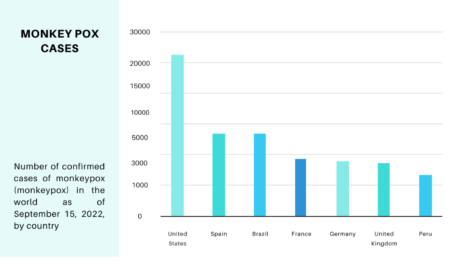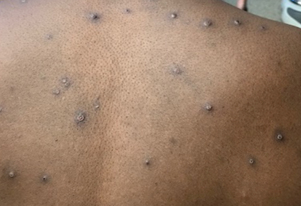How much do you know about Monkey pox?
October 21, 2022
INTRODUCTION
Monkey pox is a zoophytic viral disease that can infect nonhuman primates, rodents, and some other mammals. This virus is spread primarily by direct contact with the fluids and rashes of people who have this disease. According to the CDC “The first recorded case of this virus was in 1970, since then cases have been increasing in Africa, until May 2022, when cases were reported outside this continent. Due to this, it is important to know the treatments and preventive measures that we must take in case someone we know has this disease”
I conducted an interview with the students of the SPASH school about this disease and we realized that many people know almost nothing or nothing about this disease, this could cause an increase in cases of this disease since they do not know how it can be spread, the prevention or what are the symptoms; That is why our population must be informed about this disease to avoid an increase in cases and thus not become a pandemic.
ORIGIN AND SYMPTOMS
Monkey pox is not a new virus. This virus was first discovered in 1958 in Denmark in captive monkeys and the first human case was recorded in 1970 in Democratic Republic of the Congo – Africa, since then there have been outbreaks in Africa and a large outbreak in the United States in 2003, in which 47 human cases were recorded.
Monkey pox is a rare disease caused by infection with the monkey pox virus. The monkey pox virus is part of the same family of viruses as the smallpox virus, the symptoms are similar; although they are lighter. Monkey pox is not related to chickenpox.
Some of the symptoms of monkey pox can include fever, chills, muscle aches, headache, exhaustion, and swollen lymph nodes. Sometimes these flu-like symptoms appear first before the rash appears, other times the rash appears first and then other symptoms appear, or other times people just have the rash.
Symptoms of monkey pox usually appear 3 weeks after exposure to the virus, and the illness usually lasts 2 to 4 weeks.
TREATMENT AND HOW IT SPREADS?
There are no specific treatments or vaccines for monkey pox virus infections, but because monkey pox and smallpox viruses are genetically similar, several countries are using antiviral drugs (such as Tecovirimat, TPOXX) and vaccines, that were developed to protect against smallpox.
Monkey pox can be transmitted through direct contact with a person’s rash or body fluids through sexual intercourse or kissing, as well as if you touch objects or surfaces that have been used by someone with monkey pox
TESTING AND PREVENTION
You may order a monkey pox test if you have a rash that indicates you have monkey pox, or if you think you have had close contact with someone who has the disease. Results may take a few days. While you wait for the results, you should take precautions to avoid getting the virus or spreading it to others.
It is very important that you avoid close physical contact with other people during the time in which the disease can develop; which is 21 days from the last contact with someone sick with monkey pox. If you were to develop the disease, you will be contagious and can spread the disease to other people; this includes avoiding sexual contact and prolonged skin-to-skin contact when possible. In the case of children who are in day care, they must be excluded from the nursery or groups during the surveillance period.
COULD IT BE SAID THAT MONKEY POX COULD BECOME A PANDEMIC?
Monkey pox took the world by storm. It has long been a fixture in parts of central and western Africa where people live near forest animals that spread the virus. but now it has gone global and is spreading in ways never seen before and on an unprecedented scale.
The World Health Organization declared on Saturday July 23 that Monkey pox is a health emergency, this does not mean that it can become a pandemic but we must take our precautions.
The WHO reports 50,496 infections and 16 deaths in 101 territories. The most affected countries are the United States, Spain, Brazil, France and Germany. The countries that have reported more than 1,000 cases to the WHO are the United States (17,994), Spain (6,543), Brazil (4,693), France (3,547), Germany (3,467), the United Kingdom (3,413), Peru (1,463), Canada (1,228) and the Netherlands (1,160).
CONCLUSION
Monkey pox is not a new virus, it has existed before, however we must have our precautions and not let our guard down, because despite the fact that this virus is not new there is still no treatment or vaccines, although the antivirals and vaccines that they do exist against smallpox, they help fight, since these two viruses are genetically similar. It is important to inform ourselves about the symptoms, treatments and prevention so that in case we have the disease or know someone who has it, we know what to do.





































































